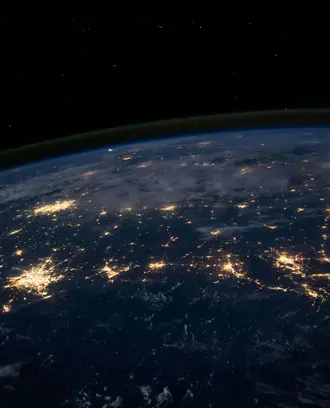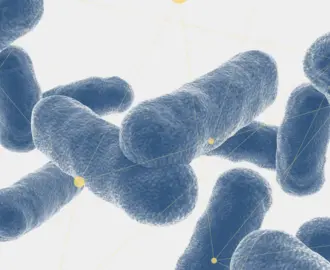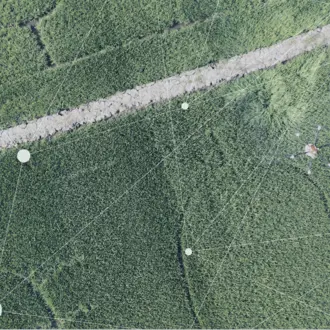Beyond the Fields: The Adaptive Leadership Revolution Against Food Insecurity
By Owusu Akoto, CEO, FreezeLink
'23-'24 Foundry Fellow
Our mission to feed and sustain the next billion people at FreezeLink is guided by an adaptive leadership framework that unites stakeholders towards a common purpose. As CEO, I proudly lead an organization that not only recognizes the magnitude of the challenge but also embraces the principles of adaptive leadership to address it effectively.
At the heart of our approach lies the recognition that no single entity can tackle the complex issue of global food security alone. It requires a coalition of stakeholders, including governments, corporations, research and development institutions, and private investors, to pool resources, expertise, and networks. Without a coalition, what you have is just a loosely connected group of players. The adaptive leadership framework, as I have been honored to learn it as a part of the Legatum Center Foundry Fellowship curriculum, underscores the importance of mobilizing these diverse stakeholders and aligning their interests with a unified purpose.
Our journey begins with listening—listening carefully to the needs, concerns, and aspirations of each stakeholder group. This foundational principle of adaptive leadership allows us to understand both the stated and unstated purposes driving their actions. By fostering open communication and empathy, we build trust and collaboration, laying the groundwork for meaningful partnerships. And by listening first, we’re able to articulate a unified purpose that rallies key stakeholders around a shared mission and vision.
Rain-fed agriculture prevails in Africa. Our farm partners may not use words like “global warming” or “climate change,” but they’re acutely aware that weather patterns are unpredictable, leaving their farms and livelihoods increasingly vulnerable, both during production and post-harvest. And lost calories are lost potential. Through FreezeLink’s innovative technologies – involving the Internet of Things (IoT) and AI - and collaborative initiatives, we aim to increase the resilience of the farm network and reduce post-harvest loss not only to enhance food security but also to mitigate its environmental impact.
Rotting food emits methane, a greenhouse gas 20x worse than carbon dioxide. Eliminating post-harvest loss reduces methane emissions, reduces hunger, and slows the rate of land clearing for agricultural use. This dual focus aligns with the core tenets of adaptive leadership, which emphasize the interconnectedness of social, economic, and environmental factors in driving sustainable change.
However, in building a coalition, we recognize the specific challenges that come with working with each stakeholder group. Government partners have scale and access to data, but in some cases, governments may inhibit the importation of equipment needed to deploy solutions by over-taxing. To address this, FreezeLink engages in proactive dialogue with governmental authorities, advocating for policies that facilitate the importation of necessary equipment at reasonable tax rates, thus enabling the swift deployment of solutions that boost food security.
Corporations also play a crucial role in creating the conditions for innovation to thrive. Through strategic partnerships and investment in research and development, corporations can contribute to the creation of a more sustainable and resilient food system. For instance, recently, FreezeLink announced that 100% of the unused food from projects it works on would be made available to the Global FoodBank Network, whose food rescue programs ensure that food gets to those who need it the most. Another major partnership will soon be announced, this time with a global shipping behemoth, to enable seamless cold chain distribution of perishable horticulture from African farms to global markets. These are ‘wins’ for health, wealth, and climate, which are a by-product of purpose-focused partnerships.
Third-sector organizations often operate with their own priorities and resource constraints, which may not always align seamlessly with FreezeLink's objectives. However, using empathy to navigate geographic and cultural differences builds our trust and credibility as a long-term partner.
Finally, our private investors, who seek high returns, who are dedicated to fighting climate change, and who understand food security challenges, are vital partners. Their willingness to embrace calculated risks and champion disruptive technologies in agriculture underscores their alignment with FreezeLink's goals, solidifying their role as invaluable partners in advancing post-harvest management and ensuring a more secure future for global food systems.
The stakes are high. Post-harvest losses disproportionately afflict not only Africa but also South Asia, Southeast Asia, the Caribbean, and Latin America—regions with a combined GDP of USD 16 Trillion and home to over 60% of humanity. As we navigate the complexities of the global food system, FreezeLink remains committed to its role as a catalyst for positive transformation informed by adaptive leadership and propelled by unity in purpose.
Owusu is the first African to serve on the Board of Directors for the Global Cold Chain Foundation. Owusu has spent 15 years designing and transforming supply chains at global companies such as Diageo, Unilever, and Procter & Gamble – including helping Unilever design the strategy for its strategic supply chain program, which earned it a World Procurement Award.
Experience encompasses leading the USD$3bn supply chain management transformation program at the UK Ministry of justice to bring about a step-change in the performance of logistics providers and other supply chains
Related Posts



